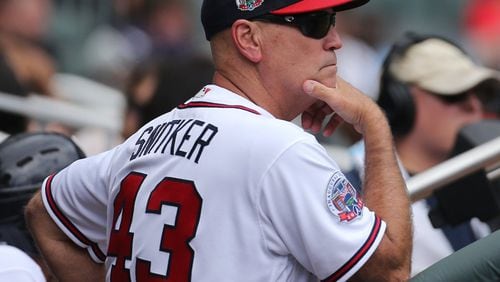Last fall's decision to remove the "interim" part of Brian Snitker's title wasn't easy. The Braves came close to hiring Bud Black, who will receive a lot of manager-of-the-year votes for his work with Colorado. In the cold light of hindsight, they would have done better with Black.
The Braves made two mistakes in October: They allowed sentiment – upper management felt indebted to Snitker for putting a smiley face on a season that was headed toward 110 losses – to override down-the-road planning, and then they hedged that bet. They gave Snitker a one-year contract, which was the equivalent of again rendering him an interim manager.
The reason the Braves need to move on from Snitker isn’t that he hasn’t won enough games, though we can never fully discount W’s and L’s. (If these Braves were 82-67 and not 67-82, he’d be getting another one-year extension.) The issue is that he has too often managed like an interim manager, which isn't what a rebuilding team needs.
We concede that this has been an odd rebuild: To placate the audience in their new Cobb County home, the Braves trotted out a remarkably old team. In some cases it worked: Matt Kemp caught a hot start; Tyler Flowers was again excellent. It didn’t in others: Bartolo Colon was terrible, Jim Johnson almost as bad. The Braves were 45-45 on the morning of July 17, which was nice. That also was the day when Snitker made the sort of short-sighted move a manager of a rebuilding team can't make.
Injured in a January car crash, Sean Rodriguez was believed out for the season. By midsummer he was playing rehab games, where he hit .077 in 39 at-bats. The Braves activated him July 17 and thrust him into the lineup at third base against the Cubs and Jon Lester. To make room for Rodriguez, Snitker shifted Johan Camargo, who’d been tearing it up, to shortstop. Dansby Swanson was benched, and in his pregame remarks Snitker all but suggested the Braves’ No. 1 prospect entering 2017 was bound for demotion.
That the manager of a .500 team about to face the reigning World Series champs in mid-July at home would try to win games is understandable. Just how a guy who hadn’t played in the majors in nine months would assist in that effort was less clear. Rodriguez clearly wasn’t ready: In 47 at-bats with the Braves, he hit .162. Then he was sent to Pittsburgh in a waiver trade. Sure enough, Swanson was then in Triple-A.
Camargo had outperformed Swanson: That’s not in dispute. Less clear was why Rodriguez, signed as a utility player, needed to start at third base – thereby displacing both Camargo and Swanson – that very minute. It seemed the knee-jerk response: When in doubt, pick the veteran. The downside was that Swanson, already in the throes of a difficult season, was embarrassed. We say again: The Braves must do everything in their power to help Swanson succeed. They need him for much more than a July series against the Cubs.
Something similar happened in June. Adonis Garcia was activated after the first of his DL stints. The rookie Rio Ruiz had been playing third base, admittedly not to great effect. There seemed a chance for a platoon. Snitker nixed it. Garcia was the starter, he announced, the same Garcia who's 32 and who has a career WAR value of 0.6. Ruiz was benched and inevitably demoted. The worst thing you can do with a young player is have him sit. Snitker sat both Ruiz and Swanson.
We can’t say that Snitker has opted for experience in every case: He did give Camargo a shot. But it’s instructive that, after Camargo tripped over the foul line, he has returned mostly as a third baseman. Swanson’s at short, Ozzie Albies at second. That, finally, is as it should be.
Therein lies my disappointment with Snitker: For a guy who has spent most of his career dealing with young players, he hasn’t been gentle with the ones he’s managing in the majors. To wit: Sean Newcomb was allowed to throw 106 pitches in his second big-league, the final inning of which stumped the band.
This was how the sixth unfolded on June 16: single, single, walk, DP, walk, wild pitch, walk. A 24-year-old yielded more base runners over six batters than in his first five innings, the walks and the wild pitch being proof that he was running on fumes. Snitker waited until midway through the inning to have a reliever start to warm and left Newcomb – with the Braves trailing 3-0 – to face a batter with the bases loaded. He somehow induced a ground out.
Snitker said afterward he was trying to let Newcomb fight through it. Me, I thought it was terrible managing, both short- and long-term. (Yes, even though it worked out that night. Bad decisions can have good results.) I also thought it was a tiny example that told a bigger truth: Snitker often seems a move or two behind.
With nearly half his roster comprised of pitchers, a manager cannot be slow to use them. Granted, these relievers aren’t a gaggle of lockdown artists, but still. They're there, and it does no good to deploy them a batter too late. There have been times when Skipper Bradley would have been striding to the mound to change pitchers, whereupon Scribe Bradley looks to yonder bullpen and sees nobody up and thinks, "Are you kidding?"
That the one-year deal did Snitker no favor is no reason to compound an error. Next year’s Braves will be much different from that of opening day in 2017: Albies and Camargo will be starting infielders; Ronald Acuna figures to be ensconced in right field. There’ll be no Garcia, no Brandon Phillips, probably no Nick Markakis, maybe no Kemp. Year 2 in SunTrust Park will feature the full-blown fruits of this massive rebuild. The Braves will need a manager to match. As it happens, there’s one on staff.
With Texas, Ron Washington steered a youngish team – much of that youth coming from the Braves in the 2007 trade for Mark Teixeira – from sub-.500 to the 2010 and 2011 World Series. Remember that bit about hedging bets? The Braves did this part rather deftly, interviewing Washington for their managerial job and hiring him as a coach but essentially as manager-in-waiting. He shouldn’t have to wait much longer.
About the Author




/cloudfront-us-east-1.images.arcpublishing.com/ajc/P7DYBH6TO7FEKG4SUXQQKADRXE.jpg)


